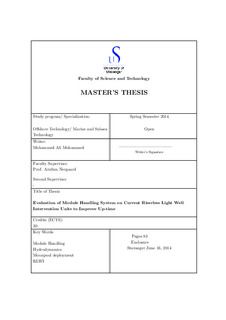| dc.description.abstract | Riserless light well intervention technology (RLWI) is the latest addition to the subsea light well intervention market. Beginning operation in mid 2005, the technology has the advantage of utilizing a special subsea lubricator to perform intervention activities in water depths of up to 1200 m without the need for marine risers. Utilizing the technology, oil companies have been able to save up to 50% on intervention costs. Nonetheless, RLWI has its own draw backs. In the last 4 years, it has seen up to 25% downtime due to waiting on weather (WOW). A look at the weather criteria of one of the RLWI vessels, Island Wellserver, indicates module deployment and retrieval to be the weather limiting operation. In this thesis work, it is attempted to identify the critical elements of the module deployment system and analyze their significance in the objective of raising the operational weather limit. Hence the module handling system was carefully studied. Critical failure modes were found to be failure of crane wire due to excess loading, failure of lower cursor system due to impact loading and clashing of module to moonpool walls. Analysis of the module deployment system against these failure modes was ensued. Orcaflex simulation software was selected. System guide wires, crane wire, vessel and moonpool were modelled. DNV recommended practice with appropriate calibration was utilized to calculate hydrodynamic coefficients for the module. Asgard field data was selected, 1-year unrestricted current condition was employed, regular wave analysis for module in moonpool and irregular wave analysis for module beneath moonpool was performed. Finally, sensitivity of the failure parameters to the system particulars was studied.
The results showed the moonpool sea-state to be a defining parameter, as would be expected. However, surprisingly enough, the study found that the vessel length is not directly related to the moonpool sea-state and a longer vessel does not necessarily mean a better platform for the module deployment operation. For the rest of the particulars studied, higher guide wires tensions, wider moonpool and active heave compensation all have a positive effect in handling the environmental loads. Although, changing moonpool dimensions affect hydrodynamics positively, their significance is small due to dependency on vessel’s breadth. Based on these results and available data for analysis, a recommended system particulars was tested. Significance improvement, up to 45%, in lowering the risk of failure was observed. A design weather limit for the recommended system was found to be less than HS = 2.5 m. This attributes to a 28% waiting on weather per operation with an operation reference period of TR = 13 h. However, estimation of complex hydrodynamic coefficients proved to be challenging and was taken conservatively. Model tests of module is recommended for this purpose. Further, a better software package like SIMO would be preferred to Orcaflex for such types of analysis. | nb_NO |
